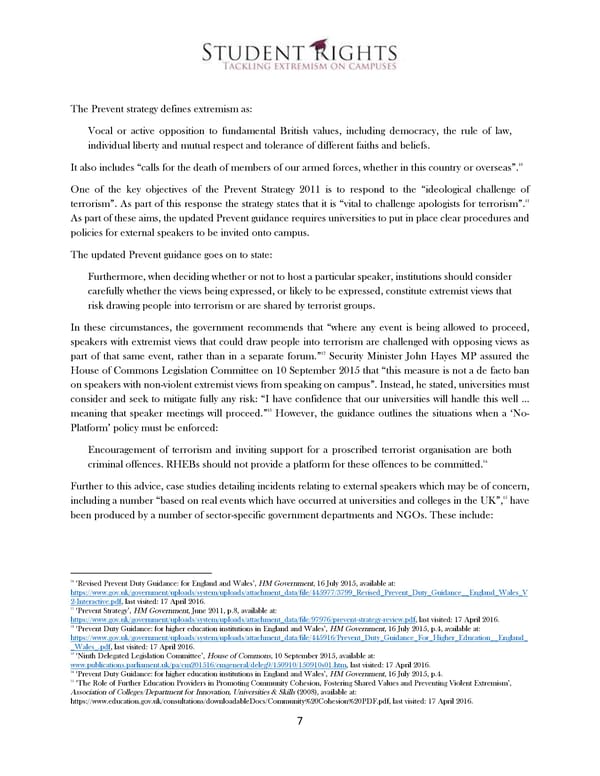! The Prevent strategy defines extremism as: Vocal or active opposition to fundamental British values, including democracy, the rule of law, individual liberty and mutual respect and tolerance of different faiths and beliefs. 10 It also includes “calls for the death of members of our armed forces, whether in this country or overseas”. One of the key objectives of the Prevent Strategy 2011 is to respond to the “ideological challenge of terrorism”. As part of this response the strategy states that it is “vital to challenge apologists for terrorism”.11 As part of these aims, the updated Prevent guidance requires universities to put in place clear procedures and policies for external speakers to be invited onto campus. The updated Prevent guidance goes on to state: Furthermore, when deciding whether or not to host a particular speaker, institutions should consider carefully whether the views being expressed, or likely to be expressed, constitute extremist views that risk drawing people into terrorism or are shared by terrorist groups. In these circumstances, the government recommends that “where any event is being allowed to proceed, speakers with extremist views that could draw people into terrorism are challenged with opposing views as 12 part of that same event, rather than in a separate forum.” Security Minister John Hayes MP assured the House of Commons Legislation Committee on 10 September 2015 that “this measure is not a de facto ban on speakers with non-violent extremist views from speaking on campus”. Instead, he stated, universities must consider and seek to mitigate fully any risk: “I have confidence that our universities will handle this well … meaning that speaker meetings will proceed.”13 However, the guidance outlines the situations when a ‘No- Platform’ policy must be enforced: Encouragement of terrorism and inviting support for a proscribed terrorist organisation are both 14 criminal offences. RHEBs should not provide a platform for these offences to be committed. Further to this advice, case studies detailing incidents relating to external speakers which may be of concern, 15 including a number “based on real events which have occurred at universities and colleges in the UK”, have been produced by a number of sector-specific government departments and NGOs. These include: !!!!!!!!!!!!!!!!!!!!!!!!!!!!!!!!!!!!!!!!!!!!!!!!!!!!!!!!!!!!! 10 ‘Revised Prevent Duty Guidance: for England and Wales’, HM Government, 16 July 2015, available at: https://www.gov.uk/government/uploads/system/uploads/attachment_data/file/445977/3799_Revised_Prevent_Duty_Guidance__England_Wales_V 2-Interactive.pdf, last visited: 17 April 2016. 11 ‘Prevent Strategy’, HM Government, June 2011, p.8, available at: https://www.gov.uk/government/uploads/system/uploads/attachment_data/file/97976/prevent-strategy-review.pdf, last visited: 17 April 2016. 12 ‘Prevent Duty Guidance: for higher education institutions in England and Wales’, HM Government, 16 July 2015, p.4, available at: https://www.gov.uk/government/uploads/system/uploads/attachment_data/file/445916/Prevent_Duty_Guidance_For_Higher_Education__England_ _Wales_.pdf, last visited: 17 April 2016. 13 ‘Ninth Delegated Legislation Committee’, House of Commons, 10 September 2015, available at: www.publications.parliament.uk/pa/cm201516/cmgeneral/deleg9/150910/150910s01.htm, last visited: 17 April 2016. 14 ‘Prevent Duty Guidance: for higher education institutions in England and Wales’, HM Government, 16 July 2015, p.4. 15 ‘The Role of Further Education Providers in Promoting Community Cohesion, Fostering Shared Values and Preventing Violent Extremism’, Association of Colleges/Department for Innovation, Universities & Skills (2008), available at: https://www.education.gov.uk/consultations/downloadableDocs/Community%20Cohesion%20PDF.pdf, last visited: 17 April 2016. 7! !
 A Model External Speaker Policy Page 8 Page 10
A Model External Speaker Policy Page 8 Page 10